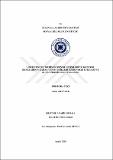DSpace Repository
LİDER YÖNETİCİLERİN ÖĞRENME BİÇİMLERİ VE KONTROL ODAKLARININ KARAR VERME STİLLERİ ÜZERİNDEKİ ETKİLERİ VE BUNA YÖNELİK BİR UYGULAMA
JavaScript is disabled for your browser. Some features of this site may not work without it.
| dc.contributor.author | Akyürek, Salim
|
|
| dc.date.accessioned | 2019-04-18T13:05:37Z | |
| dc.date.available | 2019-04-18T13:05:37Z | |
| dc.date.issued | 2016-12 | |
| dc.identifier.uri | http://hdl.handle.net/11547/1436 | |
| dc.description.abstract | Bu araştırmanın amacı, lider yöneticilerin öğrenme biçimleri ile kontrol odaklarının, karar verme stilleri üzerindeki etkilerini açıklamaktır. Bu kapsamda; öncelikle lider yöneticilerin sahip oldukları öğrenme biçimleri, kontrol odakları, karar verme stilleri belirlenmiş, daha sonra öğrenme biçimleri ile kontrol odağı ilişkisi incelenerek, öğrenme biçimleri ve kontrol odağının karar verme stili üzerindeki etkileri araştırılmıştır. Araştırmada üç adet ölçek kullanılmıştır. Bunlar, Karar Verme Stilleri Ölçeği Scott ve Bruce tarafından geliştirilmiş ve Taşdelen tarafından Türkçe’ye uyarlanmıştır. Kontrol Odağı Ölçeği, kontrol odağı merkezini belirlemek amacıyla Rotter’in İç - Dış Kontrol Odağı Ölçeği’nden yararlanılarak Dağ tarafından geliştirilmiştir. Kolb Öğrenme Öğrenme Biçimleri Envanteri, Kolb tarafından geliştirilmiş, Gencel tarafından Türkçe’ye uyarlanmıştır. Araştırma, İzmir ilinde Milli Eğitim Bakanlığına bağlı devlet liselerinde görev yapan müdürleri, müdür başyardımcılarını ve müdür yardımcılarını kapsamaktadır. Elde edilen bulgular SPSS 21.0, AMOS 20.0 ve LİSREL 9 programında analiz edilmiştir. Araştırma sonucunda; lider yöneticilerin rasyonel karar verme stilini ağrılıkla kullandıkları, iç kontrol odaklı oldukları, aktif yaşantı ve soyut kavramsallaştırma öğrenme biçimini benimsedikleri, öğrenme biçiminin ve kontrol odağının karar verme stilleri üzerinde kısmen etkili olduğu, kontrol odağının öğrenme biçimi üzerinde ise etkili olduğu sonucuna varılmıştır. Ayrıca, lider yöneticilerin karar verme stillerinin öğrenme biçimi, kontrol odağı ve bazı demografik faktörlere göre değişen oranlarda farklılaştığı tespit edilmiştir. | tr_TR |
| dc.language.iso | tr | tr_TR |
| dc.publisher | İSTANBUL AYDIN ÜNİVERSİTESİ SOSYAL BİLİMLER ENSTİTÜSÜ | tr_TR |
| dc.subject | Liderlik | tr_TR |
| dc.subject | Lider Yönetici | tr_TR |
| dc.subject | Öğrenme Biçimi | tr_TR |
| dc.subject | Kontrol Odağı | tr_TR |
| dc.subject | Karar Verme Stili | tr_TR |
| dc.subject | Leadership | tr_TR |
| dc.subject | Leader Manager | tr_TR |
| dc.subject | Learning Style | tr_TR |
| dc.subject | Locus of Control | tr_TR |
| dc.subject | Decision-Making Style | tr_TR |
| dc.title | LİDER YÖNETİCİLERİN ÖĞRENME BİÇİMLERİ VE KONTROL ODAKLARININ KARAR VERME STİLLERİ ÜZERİNDEKİ ETKİLERİ VE BUNA YÖNELİK BİR UYGULAMA | tr_TR |
| dc.type | Thesis | tr_TR |
| dc.description.abstractol | This research aims to explain the effect of learning styles and locus of focus on the decision-making styles of leader managers. Therefore; firstly, the learning styles, locus of control, decision-making styles were identified, then the relationship between the learning style and locus of control were analysed and the effects of learning styles and locus of control on the decision-making styles were investigated. Three scales were used for the research. The Decision-Making Styles Scale was developed by Scott and Bruce and adapted in Turkish by Taşdelen. The Locus of Control Scale was developed by Dağ through using the Internal-External Locus of Control Scale of Rotter to identify the locus of control centre. Kolb Learning Style Inventory was developed by Kolb and adapted to Turkish by Gencel. The research covers the school principals, head vice principals and vice principals of state high schools of Ministry of Education located in İzmir. The findings were analysed in SPSS 21.0, AMOS 20.0 and LİSREL 9 programs. The results of research indicate that the leader managers mainly use the rational decision-making styles, are internal-control oriented, adopt the active experience and abstract conceptualisation learning styles and that learning styles and locus of control are partially effective on the decision-making styles and the locus of control is effective on the learning style. Additionally, the decision-making styles differ in varying proportions in accordance with the learning style, locus of control and some demographical factors. | tr_TR |
Files in this item
This item appears in the following Collection(s)
-
Tezler -- Thesis [3470]
